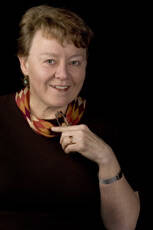When my mother brought my sister home from the hospital, she declared her to be more beautiful than most newborns. My father, brother and I looked at her puff of dark red hair, her smooth skin. It was possible my mother was right, though I had seen too few newborns to know.
That week, my mother began to teach me how to care for an infant: how, when changing a diaper, to cover the point of the safety pin with my own finger to protect her; how to hold her head at all times; how to feed and burp her, bathe and dress her. Overnight, Bobbi became the center of our family. When my mother returned to work, Bobbi became my responsibility after school and all day each summer. What a blessing!
For six years Bobbi became my constant companion. Even when I auditioned one year for the Arizona State Fair variety show, I entered my 5-year-old sister, too, with an act we had cooked up. She delivered flawlessly from memory the short story “Little Red Riding Hood,” by James Thurber, and got a big laugh with the last line, when the girl shoots the wolf.
One of our girlish pursuits was to pick fallen rose petals from the gardens of a nearby church and dry them to make potpourri. At 6, Bobbi appeared as the unofficial mascot in the photo of my high school drama club. She had attended evening rehearsals with me for years, playing in the auditorium and in the wings. Years later she would appear on that stage as the star of “Annie.”
When I left home to attend a university 1,000 miles away, Bobbi experienced a crisis of abandonment—something she couldn’t tell me until she was a teenager. That’s when I told her I had been so lonely as a college freshman that I had decorated my dorm room with her drawings and “I Love You’s,” which saved me from despair.
Two years later, when our parents both had to have surgery, I returned to Phoenix to care for Bobbi. That summer she sat with her books beneath my chair in classes at the college to which I had transferred. We were together again for a year-and-a-half until I graduated, found a job and moved out. Two years later I left Arizona. She was 10.
Since then we have seen each other only intermittently—for less than a year if all the bits were stitched together—some Christmases and vacations: two weeks in Italy, a few days in San Francisco and New York. She visited me at Koinonia Farm and came to my Harvard graduation. I missed her performances and graduation, but visited her first apartment and know well the house she bought in Phoenix. We’ve met the various “significant others” in each other’s lives. We talk for hours on the phone.
Last month, Bobbi turned 50. I flew out for a weekend to celebrate. She has survived a layoff from a job she held for more than two decades and found another job, but not at the same salary. I admire her, the way she has kept her life going, not only maintaining her house and car and dogs but also her friendships, her closeness to our parents, her Christian faith and the unassuming kindness that distinguishes her most of all. Bobbi has always looked out for others: while in her 20s she cared for an old lady who had no one to help her and even found a nursing home for her when that time came. My sister has spent vacations building schools in Bolivia and Guatemala with a group from her church and hopes to do so again. She has earned the trust and respect of her neighbors and fellow workers.
Once so wide, the years between us have shrunk. I find myself seeking my sister’s adult company, valuing her friendship, wondering if it is possible to make up for those lost decades of physical separation.









I note with relief that Karen Sue Smith did not compose this grammatically challenged lead in.
P. S. (re: Tom's comment): Leave it up to a grammarian to altogether miss the emotion and sentiment of your article.